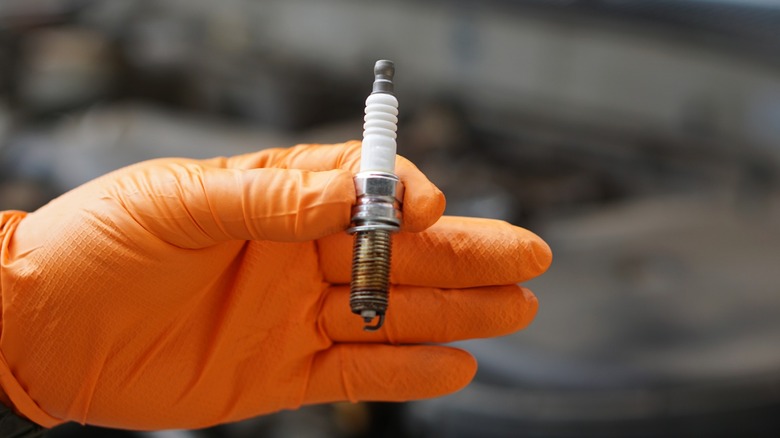How Often Should You Change Spark Plugs? Here's What Mechanics Recommend
Misfiring, rough idling, poor acceleration, and decreased fuel efficiency — the four ominous horsemen of bad spark plugs. Nobody wants to ever get to that point before desperately changing such a vital part of your engine's combustion system. It also doesn't help that these symptoms can mislead you to suspect bigger issues — even costing you some money on faux repairs — just to discover that a little spark plug negligence is the cause of your car anxiety.
The best action is to create a routine preventative replacement cycle. You'll often hear spark plug changes recommended at 30,000, 50,000, or even 100,000 miles, but how do you know which advice is right for your car? The general advice, though, is that you should follow your manufacturer's recommendation. While we've previously covered how often you should change your car's spark plugs, we want to tell you based on shop-floor and under-the-hood mechanic experience.
What mechanics generally recommend
Across the board, veteran mechanics agree that spark plug longevity depends on the material they're made from and the car they're used in. Copper spark plugs, found in many older vehicles, are often good for about 20,000 to 30,000 miles before performance starts to drop. These plugs were common in cars from the '80s through the early 2000s — especially economy cars — and while they're cheap, they don't hold up long-term.
Modern spark plugs use tougher metals that perform better under heat and pressure. Platinum spark plugs can typically last around 60,000 to 100,000 miles, while iridium (one of the hardest materials used in spark plugs) often pushes the upper limit of 100,000 miles or more. Some mechanics have even reported engines running iridium plugs past 150,000 miles without issue, though most still recommend checking around the 80,000 to 100,000 miles just to be safe.
Just as spark plugs differ in build and quality, the same applies to engines. Not all engines are designed to work with every type. Auto repair and maintenance veterans emphasize using the same type of spark plug that originally came with your car — copper, platinum, or iridium. You should only deviate if your owner's manual or a qualified technician says otherwise. Swapping out for something "better" isn't always an upgrade. Your engine's performance, fuel economy, and emissions can suffer if you deviate from its intended design. That's why expensive spark plugs may not be better than cheaper ones.
